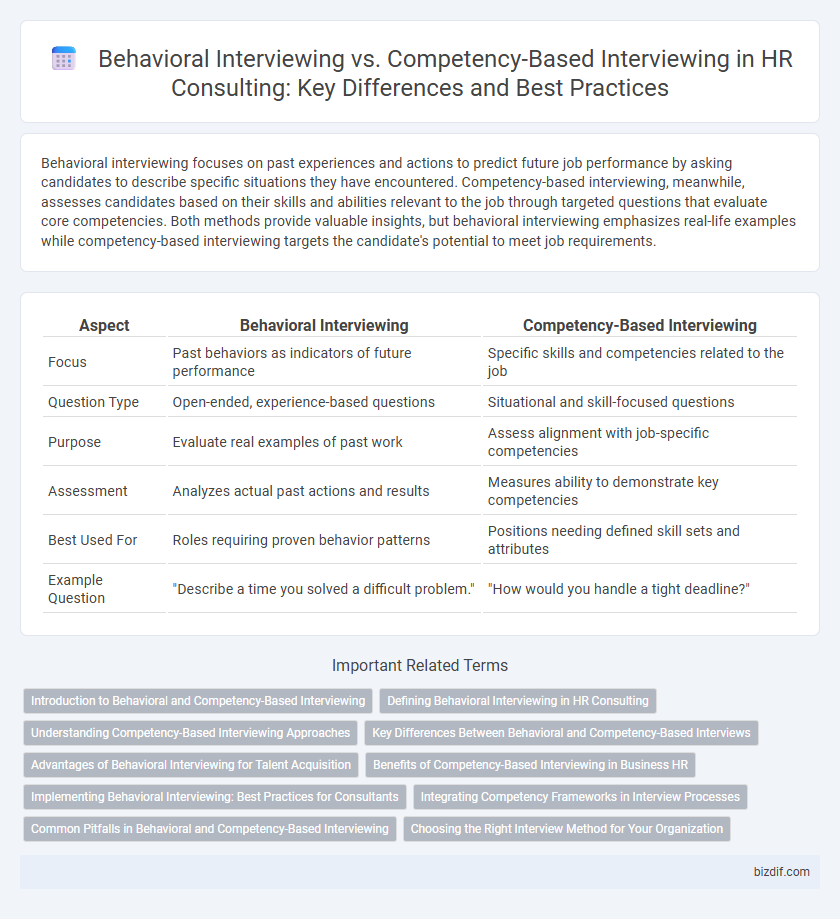Behavioral interviewing focuses on past experiences and actions to predict future job performance by asking candidates to describe specific situations they have encountered. Competency-based interviewing, meanwhile, assesses candidates based on their skills and abilities relevant to the job through targeted questions that evaluate core competencies. Both methods provide valuable insights, but behavioral interviewing emphasizes real-life examples while competency-based interviewing targets the candidate's potential to meet job requirements.
Table of Comparison
| Aspect | Behavioral Interviewing | Competency-Based Interviewing |
|---|---|---|
| Focus | Past behaviors as indicators of future performance | Specific skills and competencies related to the job |
| Question Type | Open-ended, experience-based questions | Situational and skill-focused questions |
| Purpose | Evaluate real examples of past work | Assess alignment with job-specific competencies |
| Assessment | Analyzes actual past actions and results | Measures ability to demonstrate key competencies |
| Best Used For | Roles requiring proven behavior patterns | Positions needing defined skill sets and attributes |
| Example Question | "Describe a time you solved a difficult problem." | "How would you handle a tight deadline?" |
Introduction to Behavioral and Competency-Based Interviewing
Behavioral interviewing assesses candidates by exploring past experiences and specific actions in work situations to predict future performance, focusing on how they handled challenges. Competency-based interviewing emphasizes evaluating key skills, abilities, and attributes aligned with job requirements, ensuring candidates meet organizational competencies. Both methods provide structured frameworks for objective talent evaluation and informed hiring decisions in HR consulting.
Defining Behavioral Interviewing in HR Consulting
Behavioral interviewing in HR consulting focuses on assessing candidates' past actions and experiences to predict future job performance by analyzing specific examples of how they handled work-related situations. This method uncovers patterns in behavior, problem-solving skills, and interpersonal abilities through structured questions targeting real-life scenarios. It contrasts with competency-based interviewing by emphasizing actual behaviors demonstrated rather than abstract skills or traits.
Understanding Competency-Based Interviewing Approaches
Competency-based interviewing focuses on evaluating specific skills and behaviors directly linked to job performance by asking candidates to provide examples demonstrating their abilities. This approach identifies core competencies such as problem-solving, communication, and teamwork through structured questions aligned with organizational goals. Understanding competency-based interviewing enhances the selection process by predicting future job success based on past demonstrated behaviors.
Key Differences Between Behavioral and Competency-Based Interviews
Behavioral interviewing focuses on past experiences and specific examples to predict future job performance by analyzing how candidates handled situations. Competency-based interviewing assesses candidates' skills and abilities through structured questions that target core competencies relevant to the role. Key differences include behavioral interviews emphasizing real-life examples while competency-based interviews measure alignment with defined job competencies and organizational values.
Advantages of Behavioral Interviewing for Talent Acquisition
Behavioral interviewing enhances talent acquisition by enabling employers to predict future job performance based on candidates' past behaviors in real work situations, thus reducing hiring risks. This method focuses on obtaining specific examples of skills and problem-solving abilities, offering deeper insights into a candidate's practical experience and cultural fit. Organizations using behavioral interviewing often experience improved quality of hire and stronger alignment with role requirements compared to solely competency-based approaches.
Benefits of Competency-Based Interviewing in Business HR
Competency-based interviewing enhances hiring accuracy by assessing candidates' demonstrated skills and behaviors relevant to specific job roles, leading to better employee performance and reduced turnover. It provides objective criteria that align with organizational goals, facilitating consistent evaluation across candidates and minimizing hiring biases. This method supports long-term talent development and succession planning, driving overall business success and workforce effectiveness.
Implementing Behavioral Interviewing: Best Practices for Consultants
Implementing behavioral interviewing requires HR consultants to design open-ended questions that explore candidates' past experiences and specific actions in challenging professional situations. Best practices include training interviewers to probe for detailed responses, ensuring consistency through standardized scoring rubrics, and aligning questions with core job competencies for accurate performance prediction. Utilizing behavioral interviewing enhances talent acquisition by reducing bias and improving the reliability of candidate assessments.
Integrating Competency Frameworks in Interview Processes
Integrating competency frameworks in interview processes enhances the precision of both behavioral and competency-based interviewing by clearly defining the skills, knowledge, and attributes required for job success. Competency frameworks provide a structured foundation for assessing candidates' past behaviors and demonstrated abilities, ensuring alignment with organizational goals and culture. This integration promotes consistency, objectivity, and predictive validity in hiring decisions across diverse roles and departments.
Common Pitfalls in Behavioral and Competency-Based Interviewing
Common pitfalls in behavioral and competency-based interviewing include reliance on scripted responses that do not reflect genuine past experiences, leading to inaccurate assessments of candidate capabilities. Interviewers often fail to probe deeply, missing opportunities to uncover inconsistencies or contextual factors that influence behavior and competencies. Insufficient training in question design and evaluation criteria can result in biased judgments or overemphasis on less relevant skills, undermining the predictive validity of the interview process.
Choosing the Right Interview Method for Your Organization
Behavioral interviewing focuses on past experiences and specific examples to predict future job performance, while competency-based interviewing assesses candidates' skills and abilities related to core job competencies. Selecting the right interview method depends on your organization's goals, culture, and the specific job requirements, ensuring a precise evaluation of candidate fit. Integrating both methods can enhance hiring accuracy by combining evidence of past behavior with demonstrated competencies.
Behavioral interviewing vs competency-based interviewing Infographic

 bizdif.com
bizdif.com